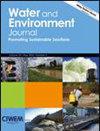公众对缺水地区使用收集的雨水的看法和接受程度
IF 1.8
4区 环境科学与生态学
Q4 ENVIRONMENTAL SCIENCES
引用次数: 0
摘要
本研究讨论了可持续获取清洁水的至关重要性,尤其是在面临严重缺水的地区。本研究调查了公众对收集雨水作为南非半干旱地区缺水解决方案的看法。110 名受访者参加了调查,调查内容包括人口统计、雨水收集方法、储存方法以及影响满意度的因素。大多数家庭(39.6%)有四到六名成员,性别分布均衡。尽管失业率普遍较高(53.2%),但有 33.6% 的人是毕业生。雨水主要在降雨时收集(64.9%),94.5%的受访者从自家屋顶收集雨水。储存方法包括乔乔水箱(41.8%)和小水桶(54.5%)。令人担忧的是,95.5% 的受访者没有检测水质,但 64.5% 的受访者认为水质可以接受。回归分析表明,水质对满意度有很大影响(b = 0.623,p < 0.005)。雨水收集的高普及率凸显了其可持续解决水资源短缺问题的潜力。本文章由计算机程序翻译,如有差异,请以英文原文为准。
Perception and acceptability of the public towards the use of harvested rainwater in water scarce regions
This study discusses the critical importance of sustainable access to clean water, particularly in regions facing severe water shortages. The study investigates the public perception of harvested rainwater as a solution to water scarcity in South Africa's semi arid regions. Conducted with 110 respondents, it explores demographics, rainwater harvesting practices, storage methods, and factors affecting satisfaction. Most households (39.6%) had four to six members, with a balanced gender distribution. Despite widespread unemployment (53.2%), 33.6% were graduates. Rainwater was harvested primarily during rainfall (64.9%), with 94.5% of the respondents collected from their own roofs. Storage methods included JoJo tanks (41.8%) and small buckets (54.5%). Concerningly, 95.5% did not test water quality, yet 64.5% found it acceptable. Regression analysis showed water quality significantly influenced satisfaction (b = 0.623, p < 0.005). The high prevalence of rainwater harvesting underscores its potential to address water shortages sustainably.
求助全文
通过发布文献求助,成功后即可免费获取论文全文。
去求助
来源期刊

Water and Environment Journal
环境科学-湖沼学
CiteScore
4.80
自引率
0.00%
发文量
67
审稿时长
18-36 weeks
期刊介绍:
Water and Environment Journal is an internationally recognised peer reviewed Journal for the dissemination of innovations and solutions focussed on enhancing water management best practice. Water and Environment Journal is available to over 12,000 institutions with a further 7,000 copies physically distributed to the Chartered Institution of Water and Environmental Management (CIWEM) membership, comprised of environment sector professionals based across the value chain (utilities, consultancy, technology suppliers, regulators, government and NGOs). As such, the journal provides a conduit between academics and practitioners. We therefore particularly encourage contributions focussed at the interface between academia and industry, which deliver industrially impactful applied research underpinned by scientific evidence. We are keen to attract papers on a broad range of subjects including:
-Water and wastewater treatment for agricultural, municipal and industrial applications
-Sludge treatment including processing, storage and management
-Water recycling
-Urban and stormwater management
-Integrated water management strategies
-Water infrastructure and distribution
-Climate change mitigation including management of impacts on agriculture, urban areas and infrastructure
 求助内容:
求助内容: 应助结果提醒方式:
应助结果提醒方式:


